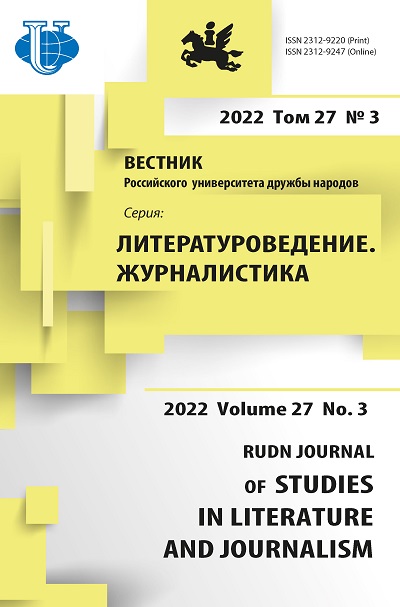Genre-format features of modern entertainment television
- Authors: Dolgova Y.I.1, Ershov N.O.1, Dung T.T.2
-
Affiliations:
- Lomonosov Moscow State University
- Peoples’ Friendship University of Russia (RUDN University)
- Issue: Vol 27, No 3 (2022)
- Pages: 573-589
- Section: JOURNALISM
- URL: https://journals.rudn.ru/literary-criticism/article/view/32311
- DOI: https://doi.org/10.22363/2312-9220-2022-27-3-573-589
- ID: 32311
Cite item
Full Text
Abstract
The highly competitive digital environment makes it necessary to study the content strategies of TV channels that continue to attract a mass audience to the screens. In the example of the program grid of the STS, TNT, and Pyatnitsa TV channels, the genre and format features of entertainment TV were analyzed. The formats in demand for programming are identified, and the seasonal (from August to December 2021) and weekly dynamics of content strategies (Tuesday, Friday, and Sunday) are shown. The list of entertainment television formats was compiled, and the research matrix was created based on the study of theoretical sources and a pilot study. The analysis showed that the selected TV channels have different content strategies. However, more successful TV channels that have been on the market for longer are building their content strategy, turning mainly to non-journalistic content formats, primarily television films and series. Among journalistic entertainment programs, humorous shows, travel shows, and reality shows were in demand. The content strategies of all TV channels on weekdays, Fridays, and Sundays were different.
About the authors
Yulia I. Dolgova
Lomonosov Moscow State University
Author for correspondence.
Email: YIDolgova@gmail.com
ORCID iD: 0000-0001-8861-0521
Associate Professor of Television and Radio Department, Faculty of Journalism
9 Mokhovaya St, Moscow, 125009, Russian FederationNikita O. Ershov
Lomonosov Moscow State University
Email: nik_ershov@yahoo.com
ORCID iD: 0000-0002-2213-5999
master's student, Television and Radio Department, Faculty of Journalism
9 Mokhovaya St, Moscow, 125009, Russian FederationTran Thi Thuy Dung
Peoples’ Friendship University of Russia (RUDN University)
Email: ladylun93@gmail.com
ORCID iD: 0000-0002-6763-7503
postgraduate student, Mass Communications Department
10 Miklukho-Maklaya St, bldg 2, Moscow, 117198, Russian FederationReferences
- Akinfiev, S.N. (2008). Genre structure of Russian entertainment television. PhD. Philol. Sci. Dis. Moscow. (In Russ.)
- Akopov, A.Z. (2015). Features of the dramaturgy of the domestic soap operase of the 1960–1980. Moscow: Akademiya Mediaindustrii Publ. (In Russ.)
- Casey, B., Calvert, B., Casey, N., French, L., & Lewis, J. (2002). Television studies: The key concepts. London: Routledge.
- Çelik, H.C., & van het Hof, S.D. (2021). The cultivation role of television in terms of violence, life in general, personality traits and the perception of old age. Vestnik Moskovskogo Universiteta. Seriya 10. Zhurnalistika, (1), 148–167. (In Russ.) http://doi.org/10.30547/vestnik.journ.1.2021.150174
- Dolgova, Yu.I., & Peripechina, G.V. (Eds.). (2021). Television journalism. Moscow: Aspekt Press. (In Russ.)
- Dolgova, Yu.I., Peripechina, G.V., & Tikhonova, O.V. (2019). Content strategies of the Big Three TV channels: Topics, genres, formats. Tomsk State University Journal of Philology, (61), 237–255. (In Russ.) http://doi.org/10.17223/19986645/61/14
- Dolgova, Yu.I., Peripechina, G.V., & Tikhonova, O.V. (2021). Programming of time slots of the Big Three TV channels: Weekday broadcast. Tomsk State University Journal of Philology, (69), 321–339. (In Russ.) http://doi.org/10.17223/19986645/69/16
- Eastman, S.T., & Ferguson, D.A. (2013). Media programming: Strategies and practices (9th ed.). Australia: Thomson/Wadsworth.
- Urazova, S.L. (Ed.). (2021). Ecosystem of media: Digital modifications. Chelyabinsk: SUSU Publ. (In Russ.)
- Firsov, B. (1971). Television through the eyes of a sociologist. Moscow: Iskusstvo Publ. (In Russ.)
- Fuks, D.A. (2021). Speech culture of Russian entertainment television: Current state and development trends. PhD. Cultural Sci. Dis. Moscow. (In Russ.)
- Greeber, G. (2015). The television genre book. London, New York: Bloomsbury Pubishing.
- Ilchenko, S.N. (2012). The system of genres of domestic television and it’s transformation under conditions of globalization of the information space. Moscow: Institut Povysheniya Kvalifikacii Rabotnikov TV i Radioveshchaniya Publ. (In Russ.)
- Kaminski, S.M., & Mahan, J.H. (1985). American television genres. Chicago: Nelson-Hall.
- Kolomiets, V.P. (2010). Russian television: Industry and business. Moscow: Voskhod-A Publ. (In Russ.)
- Lotz, A.D. (2014). The television will be revolutionized. New York University Press.
- Makeenko, M.I., & Vyrkovskij, A.V. (2021). Potential for non-institutionalized creators of entertainment and educational content to influence the audience. Vestnik Moskovskogo Universiteta. Seriya 10. Zhurnalistika, (5), 74–99. (In Russ.) http://doi.org/10.30547/vestnik.journ.5.2021.7499
- Mittel, J. (2004). Genre and television: From cop shows to cartoons in American culture. London, NewYork: Routledge.
- Mogilevskaya, V.S. (2021). Transformation of the program strategy of a niche entertainment TV channel under conditions of a competitive media environment (on the example of STS and TNT). Theoretical and Practical Issues of Journalism, 10(4), 775–791. (In Russ.) http://doi.org/10.17150/2308-6203.2021.10(4).775-791
- Novikova, A.A. (2008). Modern television spectacles: Origins, forms and methods of influence. St. Petersburg: Aletejya Publ. (In Russ.)
- Ministry of Digital Development, Communications and Mass Media of the Russian Federation (2021). Television in Russia in 2020. State, trends and prospects of development. Industry report. Moscow. (In Russ.)
- Udovichenko, R.V. (2011). Entertainment television: Typology of programs and audience needs. PhD. Philological. Sci. Dis. Moscow. (In Russ.)
- Vartanova, E.L., & Kolomiets, V.P. (Eds.). (2021). Television in Russia in 2018: State, trends and development prospects: Sector report. Moscow: Federal Agency for Press and Mass Communications. (In Russ.)
- Vartanova, E.L., & Smirnov, S.S. (2009). Russian mass media as an entertainment industry. Mediasсope, (4). (In Russ.) Retrieved May 23, 2022, from http://www.mediascope.ru/
- Volkova, I.I. (2019). TV channels on YouTube: Reasons for inefficiency. Journalism in 2018: Creativity, profession, industry: Proceedings of the International Scientific and Practical Conference (pp. 468–469). Moscow: MGU Publ. (In Russ.)
- Volkova, I.I. (2014). Playing on the TV screen as a form of effective communication. Vestnik VGIK, (1), 116–123. (In Russ.)
- Volkova, I.I. (2015). Game as a system-forming phenomenon of screen communications. Abstract of Dr. Philol. Sci. Dis. Moscow. (In Russ.)
Supplementary files















